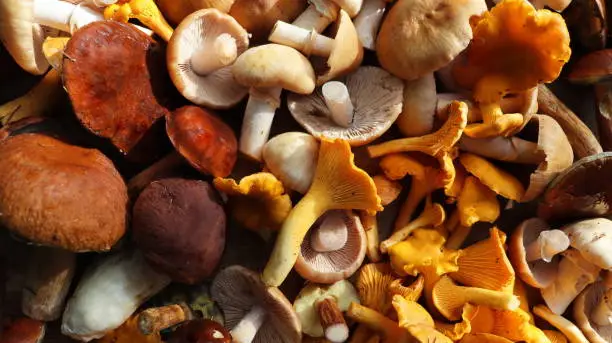
As the global population continues to rise, concerns about the environmental impact of meat production and the health risks associated with high meat consumption have become more pressing. Many people are turning to plant-based alternatives to reduce their ecological footprint and improve their well-being. Among these alternatives, mushrooms have emerged as a standout choice for those seeking to replace meat in their diets. With their rich texture, umami flavor, and impressive nutritional profile, mushrooms offer a delicious, sustainable, and healthy option for those looking to cut back on animal products.
1. Nutritional Benefits of Mushrooms
Mushrooms are a powerhouse of nutrients, making them an excellent substitute for meat in terms of both health and taste. They are low in calories, fat, and carbohydrates, yet high in fiber, vitamins, and minerals. Key nutrients found in mushrooms include:
- Protein: Mushrooms are a good source of plant-based protein, with certain varieties like shiitake and portobello containing comparable amounts of protein to some meats.
- B vitamins: Mushrooms are rich in B-vitamins like riboflavin, niacin, and pantothenic acid, which are essential for energy production and nervous system function.
- Minerals: Mushrooms provide important minerals, including potassium, which helps regulate blood pressure, and selenium, an antioxidant that supports immune function.
- Vitamin D: Unlike most plant-based foods, mushrooms can naturally produce vitamin D when exposed to sunlight, making them a valuable source of this nutrient for those following a plant-based diet.
In addition, mushrooms contain antioxidants like ergothioneine, which help protect cells from damage and inflammation, and beta-glucans, which support immune health. These compounds contribute to the overall health benefits of incorporating mushrooms into your diet.
2. Mushrooms’ Umami Flavor and Meat-Like Texture
One of the primary reasons mushrooms have become a popular meat alternative is their ability to mimic the savory, umami flavor of meat. Umami, often referred to as the fifth taste, is found in high concentrations in many animal products. However, mushrooms naturally contain glutamate, the amino acid responsible for the umami flavor, making them an ideal substitute for the meaty richness that many people crave.
Additionally, mushrooms have a unique, dense texture that resembles meat, especially when cooked. Varieties like portobello, shiitake, and oyster mushrooms can be grilled, roasted, or sautéed to develop a hearty, satisfying bite. When sliced or chopped, mushrooms can replicate the texture of ground meat in dishes such as burgers, tacos, or pasta sauces.
3. Sustainability and Environmental Impact
Mushrooms are not only a nutritious food choice, but they are also a more sustainable option compared to animal-based meats. The environmental impact of mushroom farming is significantly lower than that of traditional livestock production. Here’s why:
- Lower carbon footprint: Growing mushrooms produces far fewer greenhouse gas emissions than raising livestock. This makes mushrooms an eco-friendly alternative to meat, especially in the context of climate change.
- Water efficiency: Mushroom cultivation uses considerably less water than livestock farming, which is crucial in regions affected by water scarcity.
- Less land use: While livestock requires vast amounts of land for grazing or growing feed, mushrooms can be cultivated in smaller spaces, making them more efficient in terms of land use.
- Waste recycling: Many mushroom farms use agricultural byproducts like straw or sawdust as growing mediums, turning organic waste into a valuable food source. This helps reduce the amount of waste that ends up in landfills.
By opting for mushrooms, consumers can help mitigate the environmental degradation caused by the meat industry while still enjoying satisfying and flavorful meals.
4. Versatility in Cooking
Mushrooms can be used in a variety of dishes, making them a versatile ingredient in the kitchen. Whether you’re looking to make a meat-free burger, a savory stir-fry, or a rich stew, mushrooms can easily take center stage in place of animal-based protein. Some popular ways to incorporate mushrooms into your meals include:
- Mushroom burgers: A grilled portobello cap or a blend of finely chopped mushrooms can replace a traditional beef patty, offering a juicy and satisfying alternative.
- Mushroom-based “meatballs”: By combining mushrooms with breadcrumbs and seasonings, you can create flavorful meatballs that are perfect for pasta or sandwiches.
- Mushroom stir-fry: Sautéed mushrooms, along with vegetables and tofu or tempeh, can create a delicious and nutrient-packed stir-fry.
- Mushroom tacos: Sauteed mushrooms can be seasoned with spices like cumin and chili powder for a meatless taco filling that’s rich in flavor and texture.
Mushrooms can also be used to add depth and complexity to soups, stews, and sauces. Their ability to absorb flavors from other ingredients makes them an ideal choice for creating rich, umami-packed dishes.
5. Healthier Diet and Ethical Considerations
Reducing meat consumption has been linked to numerous health benefits, including a lower risk of heart disease, obesity, and certain cancers. By incorporating mushrooms into your meals, you can enjoy these health benefits without sacrificing flavor or satisfaction. Mushrooms are also cholesterol-free, which can be an important factor for those concerned about heart health.
In addition to the health benefits, choosing mushrooms over meat aligns with ethical concerns regarding animal welfare. As more people become aware of the conditions in which animals are raised for food, many are seeking compassionate alternatives. Mushrooms, as a plant-based food, offer a cruelty-free option for those wishing to make more ethical food choices.

Mushrooms are a powerhouse of nutrition, sustainability, and flavor, making them an excellent alternative to meat. They provide a rich, umami flavor and meaty texture that can satisfy even the most dedicated carnivores, while also offering a range of health benefits. With their minimal environmental impact and versatility in cooking, mushrooms are an ideal choice for those looking to reduce their meat consumption and embrace a more sustainable, plant-based lifestyle. Whether you’re a longtime vegetarian or simply looking to try something new, mushrooms are a flavorful and nutritious addition to any meal.

